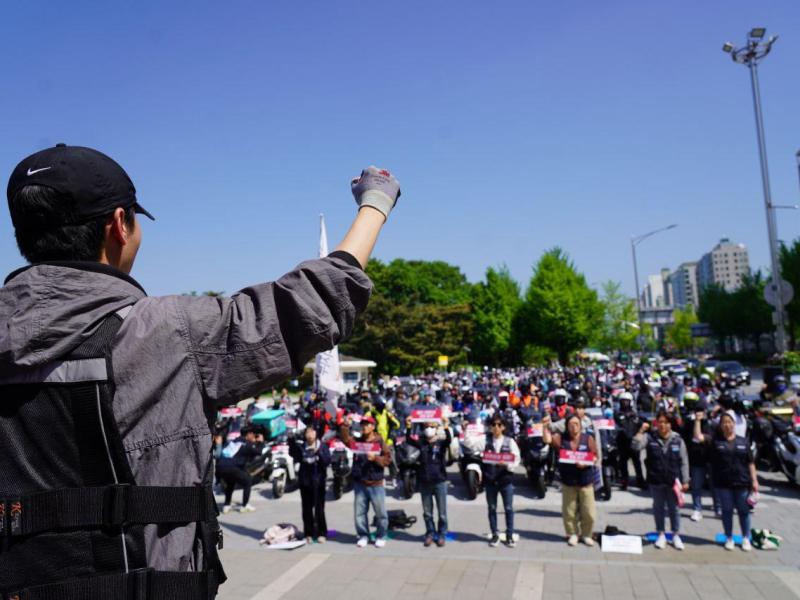Maritime Just Transition Task Force collaborative project sets framework to equip seafarers with skills as shipping transitions to zero emissions.
30 November 2023, London – A new training project will prepare seafarers for zero or near-zero emission ships, helping the global shipping industry decarbonize and ensure a just transition for seafarers.
Research commissioned by the Maritime Just Transition Task Force identified that 800,000 seafarers may require additional training by the mid-2030s in order to operate vessels run on zero or near zero emission fuels.
With seafarers at the core of the shipping industry, this training is vital to ensure a successful and just transition to a new shipping landscape. The training framework, funded through the International Maritime Organization (IMO) and Lloyd’s Register Foundation, will equip seafarers with skills in decarbonization, and provide guidance for trainers and the industry.
The project is being announced at the 2023 UN Climate Change Conference (COP 28), meeting in Dubai, United Arab Emirates, from 30 November to 12 December 2023.
Stephen Cotton, General Secretary of the International Transport Workers’ Federation, explains: “Seafarers are at the heart of the just transition needed in the shipping industry, and training the current and future workforce is crucial to ensure that workers’ expertise is front and centre as the industry transitions and decarbonizes. We have heard the message loud and clear from seafarers around the world, they are ready to lead, they are ready to shape the training frameworks for the zero carbon fuels of the future.”
Preparing the entire shipping industry for the green transition is essential. The 2023 IMO Strategy on Reduction of GHG Emissions from Ships sets a common ambition to reach net-zero GHG emissions from international shipping by or around 2050 (taking into account different national circumstances); and a commitment to ensure an uptake of zero or near-zero GHG emission technologies, fuels and/or energy sources to represent at least 5%, striving for 10%, of the energy used by international shipping, by 2030.
Kitack Lim, Secretary General of the International Maritime Organization, said: “The milestone adoption by IMO of the 2023 Strategy on the Reduction of Greenhouse Gas Emissions from Shipping shows the member States’ clear commitment to transitioning the shipping industry to a decarbonized future. To do this, we need to ensure no one is left behind and we need to commit to training the workforce so that they are ready. This collaborative project will help ensure a successful and equitable transition, harnessing the collective strength of the global maritime community.”
Ensuring a safe working environment for seafarers, as well as the effective management and operation of future technologies is at the heart of this project. The need for dedicated training has been identified by IMO and social partners. IMO is comprehensively reviewing and revising its key treaty for seafarer training, the International Convention on Standards of Training, Certification and Watchkeeping for Seafarers (STCW), with input from industry, and seafarers’ unions.
Ruth Boumphrey, CEO of Lloyd’s Register Foundation, comments: “Moving towards a low-emission future will require new green jobs and reskilling, and the global maritime industry is no different. Future alternative fuel technologies, such as hydrogen, ammonia and methanol, means there is a vital need to up-skill all seafarers. That’s why the work of the Maritime Just Transition Taskforce and its latest training framework is essential to ensuring seafarers have the right training and skills to work in a safe environment. It puts seafarers and communities at the heart of the solution as the industry works towards achieving its target for net zero emissions for shipping by 2050.”
The project will be run by IMO and the Maritime Just Transition Task Force Secretariat. Lloyd’s Register will develop the training framework for seafarers and officers, as well as an instructor handbook for maritime training institutions. The World Maritime University (WMU), an IMO global research, education and training institute based in Malmö, Sweden, will provide academic expertise. A large number of organisations are involved through a global industry peer learning group, which will provide important knowledge-sharing.
Once developed, the Baseline Training Framework for Seafarers in Decarbonization will be first tested out in Asia through a programme led by WMU, with support from the IMO Maritime Technology Cooperation Centre (MTCC) Asia and other partners. Training materials will be developed for all seafarers and for officers. The aim is to then expand testing of the package globally with all the established MTCCs and other appropriate organisations.
Guy Platten, Secretary General of the International Chamber of Shipping, said: “2030 is just around the corner and we cannot be complacent about the needs of our seafarers and the appropriate training being in place to support them during our transitioning sector. Without our people we have no industry so seafarers should always be at the forefront of every decision. As we move forward into Phase II of the Maritime Just Transition programme, we must now all continue to work together and further build on the strong relationships formed in Phase I to ensure that our seafarers have the training they need.”
This package will be available to IMO Member States, for potential use by maritime education and training (MET) institutes to develop their programmes, as appropriate. A ‘train the trainer’ programme will also be developed to assist METs further.
Sturla Henriksen, Special Advisor Ocean of the United Nations Global Compact, adds: “Decarbonizing shipping is essential to combat the climate crisis. The global nature of this transition means that no one is alone in tackling this issue and the Maritime Just Transition Task Force is committed to providing resources to support stakeholders making this journey.”
The Maritime Just Transition Task Force was formed at COP 26 in 2021 by the International Chamber of Shipping (ICS), the International Transport Workers’ Federation (ITF), the United Nations Global Compact, IMO and the International Labour Organization (ILO). Primarily supported by funding from Lloyd’s Register Foundation, the taskforce has worked to ensure seafarers are put at the heart of shipping’s response to the climate emergency. The timeline is to develop the training materials by mid-2025.
-ENDS-
Notes to editor:
Background:
The genesis of this initiative at IMO, goes back to a project initiated in the Philippines in 2021 to improve the safety and energy efficiency of its domestic ferry fleet. The need to train seafarers was identified as one of the follow up actions. IMO developed a thematic project to assist the Maritime Education and Training (MET) Institutions in Asia, particularly in seafarer-supplying countries, to develop specific training on energy efficiency for seafarers.
The IMO Secretariat and the Maritime Just Transition Task Force agreed to embark on this partnership project to develop a Baseline Training Framework for Seafarers in Decarbonization, recognizing the benefits of working together. The aim would be for this to be expanded to all the MET Institutions around the globe.
This project also marks the start of a second phase of the Maritime Just Transition Task Force. Phase 1 delivered a DNV-led report Seafarer training and skills for decarbonized shipping on how best to support the maritime workforce in making the shift to a decarbonized shipping industry, highlighting the need to accelerate training for alternative fuels. This project will assist in implementing recommendations put forward in the report.
Information about the organisations involved in project ‘Baseline Training Framework for Seafarers in Decarbonization’:
United Nations Global Compact
As a special initiative of the United Nations Secretary-General, the UN Global Compact is a call to companies worldwide to align their operations and strategies with Ten Principles in the areas of human rights, labour, environment and anti-corruption. Our ambition is to accelerate and scale the global collective impact of business by upholding the Ten Principles and delivering the Sustainable Development Goals through accountable companies and ecosystems that enable change. unglobalcompact.org
International Maritime Organization
IMO – the International Maritime Organization – is the United Nations specialized agency with responsibility for the safety and security of shipping and the prevention of marine and atmospheric pollution by ships. IMO's work supports the UN SDGs. www.imo.org
International Chamber of Shipping
The International Chamber of Shipping (ICS) is the principal international trade association for merchant shipowners and operators, representing all sectors and trades and over 80% of the world merchant fleet. www.ics-shipping.org
International Transport Workers’ Federation
The International Transport Workers’ Federation (ITF) is a democratic, affiliate-led federation of transport workers’ unions recognised as the world’s leading transport authority. We fight passionately to improve working lives; connecting trade unions and workers’ networks from 150 countries to secure rights, equality and justice for their members. We are the voice of the almost 20 million women and men who move the world, including over a million seafarers working in domestic trade and international shipping.
Lloyd’s Register Foundation
Lloyd’s Register Foundation is an independent global charity that supports research, innovation, and education to make the world a safer place. Its mission is to use the best evidence and insight to help the global community focus on tackling the world’s most pressing safety and risk challenges. For more information, please visit www.lrfoundation.org.uk
World Maritime University
The World Maritime University (WMU) in Malmö, Sweden is established within the framework of the International Maritime Organization (IMO), a specialized agency of the United Nations. The mission of WMU is to be the world centre of excellence in postgraduate maritime and oceans education, professional training and research, while building global capacity and promoting sustainable development. WMU’s vision is to inspire leadership and innovation for a sustainable maritime and oceans future. WMU is an organization by and for the international maritime community and is committed to the United Nations 2030 Sustainable Development Agenda. www.wmu.se
Lloyd’s Register
Lloyd’s Register (LR) is a global professional services group specialising in marine engineering and technology. Created more than 260 years ago as the world’s first marine classification society, to improve and set standards for the safety of ships, we are a leading provider of classification and compliance services to the marine and offshore industries and we also provide advice, support and solutions on fleet performance and optimisation and voyage optimisation. Lloyd’s Register Group is wholly owned by the Lloyd’s Register Foundation, a politically and financially independent global charity that promotes safety and education. www.lr.org


